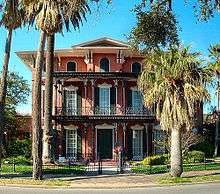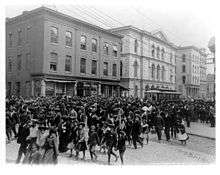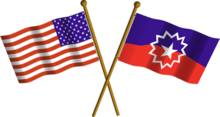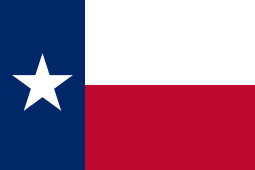Juneteenth
Juneteenth, also known as Freedom Day[1] or Juneteenth independence day, is an American holiday that commemorates the June 19, 1865, announcement of the abolition of slavery in Texas, and more generally the emancipation of enslaved African Americans throughout the former Confederate States of America, outside Native American lands. Texas was the most remote of the slave states, and the Emancipation Proclamation of January 1, 1863, was not enforced there until after the Confederacy collapsed. The name of the observance is a portmanteau of "June" and "nineteenth", the date of its celebration.[2]
| Juneteenth | |
|---|---|
| Also called | Freedom Day or Emancipation Day |
| Observed by | Residents of the United States, especially African Americans Mascogos |
| Type | Ethnic, historical |
| Significance | Emancipation of the last remaining enslaved African Americans in the Confederacy |
| Observances | Exploration and celebration of African-American history and heritage |
| Date | June 19 |
| Next time | June 19, 2020 |
| Frequency | Annual |
At first celebration involved church-centered community gatherings in Texas. It spread across the South and became more commercialized between in the 1920s and 1930s. Often the centerpiece was a food festival. A third stage was reached in the Civil Rights movement of the 1960s, when the focus became the story of struggle for postwar civil rights. The 1970s saw a fourth stage, which returned the focus to African American freedom and arts. By the 21st century Juneteenth was celebrated in most major cities across the United States.[3] Activists are pushing Congress to recognize Juneteenth as a national holiday.[4] Juneteenth is recognized as a state holiday or special day of observance in 46 of the 50 states.[5]
Observance is primarily in local celebrations. Traditions include public readings of the Emancipation Proclamation, singing traditional songs such as "Swing Low, Sweet Chariot" and "Lift Every Voice and Sing", and reading of works by noted African-American writers such as Ralph Ellison and Maya Angelou.[6] Celebrations include rodeos, street fairs, cookouts, family reunions, park parties, historical reenactments, or Miss Juneteenth contests.[7] The Mascogos, descendants of Black Seminoles, of Coahuila, Mexico also celebrate Juneteenth.[8]
History
During the American Civil War, President Abraham Lincoln issued the Emancipation Proclamation on September 22, 1862, with an effective date of January 1, 1863. It declared that all enslaved persons in the Confederate States of America in rebellion and not in Union hands were to be freed. This excluded the five states known later as border states, which were the four "slave states" not in rebellion – Kentucky, Maryland, Delaware, and Missouri – and those counties of Virginia soon to form the state of West Virginia, and also the three zones under Union occupation: the state of Tennessee, lower Louisiana, and Southeast Virginia.


More isolated geographically, Texas was not a battleground, and thus the people held there as slaves were not affected by the Emancipation Proclamation unless they escaped.[9] Planters and other slaveholders had migrated into Texas from eastern states to escape the fighting, and many brought enslaved people with them, increasing by the thousands the enslaved population in the state at the end of the Civil War.[10] Although most enslaved people lived in rural areas, more than 1,000 resided in both Galveston and Houston by 1860, with several hundred in other large towns.[11] By 1865, there were an estimated 250,000 enslaved people in Texas.[10]
The news of General Robert E. Lee's surrender on April 9 reached Texas later in the month.[12] The Army of the Trans-Mississippi did not surrender until June 2.[10] On June 18, Union Army General Gordon Granger arrived at Galveston Island with 2,000 federal troops to occupy Texas on behalf of the federal government.[9] The following day, standing on the balcony of Galveston's Ashton Villa, Granger read aloud the contents of "General Order No. 3", announcing the total emancipation of those held as slaves:
The people of Texas are informed that, in accordance with a proclamation from the Executive of the United States, all slaves are free. This involves an absolute equality of personal rights and rights of property between former masters and slaves, and the connection heretofore existing between them becomes that between employer and hired labor. The freedmen are advised to remain quietly at their present homes and work for wages. They are informed that they will not be allowed to collect at military posts and that they will not be supported in idleness either there or elsewhere.[13]


Formerly enslaved people in Galveston rejoiced in the streets after the announcement, although in the years afterward many struggled to work through the changes against resistance of whites. The following year, freedmen organized the first of what became the annual celebration of Juneteenth in Texas.[13] In some cities African-Americans were barred from using public parks because of state-sponsored segregation of facilities. Across parts of Texas, freed people pooled their funds to purchase land to hold their celebrations, such as Houston's Emancipation Park, Mexia's Booker T. Washington Park, and Emancipation Park in Austin.[10][13]
Although the date is sometimes referred to as the "traditional end of slavery in Texas" it was given legal status in a series of Texas Supreme Court decisions between 1868 and 1874.[14]
In the early 20th century, economic and political forces led to a decline in Juneteenth celebrations. From 1890 to 1908, Texas and all former Confederate states passed new constitutions or amendments that effectively disenfranchised black people, excluding them from the political process. White-dominated state legislatures passed Jim Crow laws imposing second-class status. The Great Depression forced many black people off farms and into the cities to find work. In these urban environments, African Americans had difficulty taking the day off to celebrate. The Second Great Migration began during World War II, when many black people migrated to the West Coast where skilled jobs in the defense industry were opening up.[15] From 1940 through 1970, in the second wave of the Great Migration, more than 5 million black people left Texas, Louisiana and other parts of the South for the North and West Coast. As historian Isabel Wilkerson writes, "The people from Texas took Juneteenth Day to Los Angeles, Oakland, Seattle, and other places they went."[16]
By the 1950s and 1960s, the Civil Rights Movement focused the attention of African-American youth on the struggle for racial equality and the future, but many linked these struggles to the historical struggles of their ancestors. Following the 1968 Poor People's Campaign to Washington, DC called by Rev. Ralph Abernathy, many attendees returned home and initiated Juneteenth celebrations in areas where the day was not previously celebrated.
Since the 1980s and 1990s, the holiday has been more widely celebrated among African-American communities. In 1994 a group of community leaders gathered at Christian Unity Baptist Church in New Orleans, Louisiana to work for greater national celebration of Juneteenth.[17] Expatriates have celebrated it in cities abroad, such as Paris.[18] Some US military bases in other countries sponsor celebrations, in addition to those of private groups.[18][19]
Although the holiday is still mostly unknown outside African-American communities, it has gained mainstream awareness through depictions in entertainment media, such as episodes of TV series Atlanta (2016)[20] and Black-ish (2017),[21] the latter of which featured musical numbers about the holiday by Aloe Blacc, The Roots,[22] and Fonzworth Bentley.[23][24]
Official status
In 1980, Texas was the first state to establish Juneteenth as a state holiday under legislation introduced by freshman Democratic state representative Al Edwards.[25] Juneteenth is a "partial staffing" holiday in Texas; government offices do not close but agencies may operate with reduced staff, and employees may either celebrate this holiday or substitute it with one of four "optional holidays" recognized by Texas.[26]

By 2008, nearly half of US states observed the holiday as a ceremonial observance.[9] Forty-six of the 50 U.S. states and the District of Columbia have recognized Juneteenth as either a state holiday or ceremonial holiday, a day of observance. The four states that do not recognize Juneteenth are Hawaii, North Dakota, South Dakota, and Montana.[27]
In 1996 the first legislation to recognize "Juneteenth Independence Day" was introduced in the U.S. House of Representatives, H.J. Res. 195, sponsored by Barbara-Rose Collins (D-MI). In 1997 Congress recognized the day through Senate Joint Resolution 11 and House Joint Resolution 56. In 2013 the U.S. Senate passed Senate Resolution 175, acknowledging Lula Briggs Galloway (late president of the National Association of Juneteenth Lineage) who "successfully worked to bring national recognition to Juneteenth Independence Day", and the continued leadership of the National Juneteenth Observance Foundation.[28] In 2018 Apple added Juneteenth to its calendars in iOS under official US holidays.[29]
Organizations such as the National Juneteenth Observance Foundation are seeking a Congressional designation of Juneteenth as a national day of observance.[10]
See also
- 13th Amendment to the U.S. Constitution
- Emancipation Day
- History of African Americans in Texas
- Negro Election Day
- Serfs Emancipation Day
- Slavery in the United States
- Miss Juneteenth
References
- "Juneteenth: Our Other Independence Day". Smithsonian. Retrieved June 27, 2019.
- "Juneteenth Celebrated in Coachella". Black Voice News. June 22, 2011. Archived from the original on January 22, 2012.
- Emily Blanck, "Galveston on San Francisco Bay: Juneteenth in the Fillmore District, 1945–2016." Western Historical Quarterly 50.2 (2019): 85-112.
- E.H. Turner, . "Juneteenth: The Evolution of an Emancipation Celebration." European Contributions to American Studies. 65 (2006): 69-81.
- "All but four US states celebrate Juneteenth as a holiday". CNN. Retrieved June 19, 2019.
- Taylor, 2002. pp. 28–29.
- "How to Celebrate". Juneteenth.com. Retrieved June 19, 2014.
- "Mascogos. Siempre listos para partir". El Universal (in Spanish). September 19, 2016. Retrieved July 31, 2017.
Sin embargo, la fiesta de la comunidad es el 19 de junio – el Juneteenth Day en Estados Unidos – el día que los esclavos de Galveston, Texas, supieron que eran libres.
- Cruz, Gilbert (June 18, 2008). "A Brief History of Juneteenth". Time magazine. Retrieved May 30, 2013.
- Gates, Henry Louis, Jr. "What Is Juneteenth?". The African Americans: Many Rivers to Cross. PBS. Originally posted on The Root. Retrieved September 30, 2014.
- Barr (1996), p. 24.
- The Texas Republican (Marshall), April 28, 1865, p. 2, contains a reference to the surrender
- "Juneteenth". Texas State Library and Archives Commission. Retrieved July 6, 2006.
- Campbell, Randolph (1984). "The End of Slavery in Texas: A Research Note". Southwestern Historical Quarterly. 88 (1): 71–80.
- Adams, Luther (November 29, 2010). Way Up North in Louisville: African American Migration in the Urban South, 1930–1970. University of North Carolina Press. ISBN 978-0807899434.
- Wilkerson, Isabel (2010). The Warmth of Other Suns: The Epic Story of America's Great Migration. New York: Random House. Retrieved June 19, 2015.
- Chandler, D.L. (June 19, 2012). "Juneteenth: Celebrating The Early Moments Of Freedom Today". News One. Retrieved June 19, 2014.
- Moskin, Julie (June 18, 2004). "An Obscure Texas Celebration Makes Its Way Across the U.S." The New York Times. Retrieved April 28, 2011.
- "The World Celebrates Freedom". Juneteenth.com. Retrieved June 19, 2006.
- Ho, Rodney (October 25, 2016). "FX's 'Atlanta' recap ('Juneteenth'): season 1, episode 9". Atlanta Journal-Constitution. Retrieved June 18, 2018.
- Framke, Caroline (October 4, 2017). "Black-ish's musical episode about Juneteenth is a pointed lesson on American ignorance". Vox. Retrieved June 18, 2018.
- "I Am A Slave". YouTube. ABC News. Retrieved June 18, 2018.
- "We Built This". YouTube. ABC Television Network. Retrieved June 18, 2018.
- Butler, Berhonie (October). "'Blackish' gives a powerful history lesson – with nods to 'Hamilton' and 'Schoolhouse Rock'". Washington Post. Retrieved June 18, 2018. Check date values in:
|date=(help) - Dingus, Anne (June 2001). "Once a Texas-only holiday marking the end of slavery, Juneteenth is now celebrated nationwide with high spirits and hot barbecue". Texas Monthly. Retrieved October 11, 2013.
- "State of Texas Holiday Schedule - Fiscal 2019". comptroller.texas.gov. Retrieved June 19, 2019.
- "All but four US states celebrate Juneteenth as a holiday". CNN. Retrieved June 19, 2019.
- "S.Res.175 – A resolution observing Juneteenth Independence Day, June 19, 1865, the day on which slavery finally came to an end in the United States". United States Congress. June 19, 2013. Retrieved June 19, 2015.
- Ciaccia, Chris (February 16, 2018). "Apple's iCal calendar mysteriously deletes Easter". Fox News.
Bibliography
- Barr, Alwyn (1996). Black Texans: A History of African Americans in Texas, 1528–1995. University of Oklahoma Press. ISBN 978-0806128788.
- Campbell, Randolph B. "The End of Slavery in Texas" Southwestern Historical Quarterly 88.1 (1984): 71-80.
- Hume, Janice, and Noah Arceneaux. "Public Memory, Cultural Legacy, and Press Coverage of the Juneteenth Revival." Journalism History 34.3 (2008): 155-162.
- Taylor, Charles A. (2002). Juneteenth: A Celebration of Freedom. Open Hand Pub Llc. ISBN 978-0940880689.
- Turner, E. H. "Juneteenth: The Evolution of an Emancipation Celebration." European Contributions to American Studies. 65 (2006): 69-81.
- Wiggins Jr, William H. "They Closed the Town Up, Man! Reflections on the Civic and Political Dimensions of Juneteenth." in Celebration: Studies in Festivity and Ritual, ed. Victor Turner (1982): 284-295.
External links
| Wikimedia Commons has media related to Juneteenth. |
- Juneteenth History, website for Juneteenth World Wide Celebration
- Jennifer Schuessler, "Liberation as Death Sentence", The New York Times, June 11, 2012
- Berkeley Juneteenth Festival, 2014 celebration
- Juneteenth: Fact Sheet Congressional Research Service
- Juneteenth in United States
- Juneteenth World Wide Celebration, website for 150th anniversary celebration
